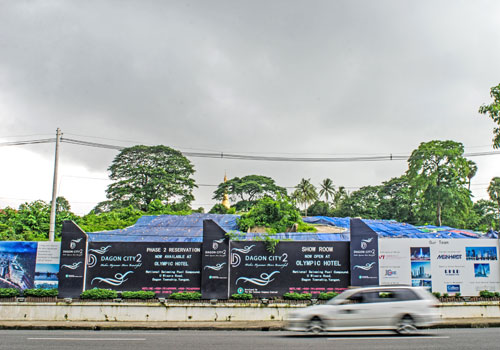For many years, large areas of land in Yangon have been handed over to well-connected companies for development, with little or no public information about the terms of the deals, and no space for smaller businesses to compete, said an industry body.

Advertisements outside developments near to the Shwedagon Pagoda were taken down after the projects were suspended indefinitely due to public opposition. Photo: Naing Wynn Htoon / The Myanmar TimesAdvertisements outside developments near to the Shwedagon Pagoda were taken down after the projects were suspended indefinitely due to public opposition. Photo: Naing Wynn Htoon / The Myanmar Times
The Myanmar Construction Entrepreneurs Association (MCEA) held a special meeting last week to discuss the urgent need for change. Many members said they hope the new government will introduce a transparent tendering system for the first time.
U Thar Htay, chair of the 3000-member industry association, said that in the past, only a handful of local companies have been able to compete with giant foreign developers.
“We have often competed in tenders in Yangon Region, but have never once won,” he said, referring to his Myanmar Construction and Development Public Company, set up last year by a number of MCEA members.
Developer U Kyaw Kyaw Soe said he believes the new government, led by the National League for Democracy, “can work more transparently”, adding he hopes smaller companies will be given the opportunity to take part in state projects.
A number of MCEA members – 700 of which are developers – said they expect the new government will revise the rules and procedures governing the tendering process.
In the past, land tenders in Yangon and elsewhere in Myanmar have been fraught with controversy. U Aye Lin, MCEA’s associate secretary told The Myanmar Times that giant developers always beat medium-sized construction companies in auctions for government projects, as the tender system is biased.
“To be honest, it was like they were selecting only those who consistently worked with them. They always invited tenders just one week ahead of the closing date, so our suggestions had weaknesses,” he said.
“There can’t be such a personal bias when new government takes office,” he said, adding that he hopes the incoming administration will learn from mistakes made by the outgoing government.
Despite widespread dissatisfaction with the tendering process, over the past few years, public opposition has led the government to abandon a number of less-than-transparent deals in Yangon.
For example, the Yangon Region government last year backtracked on a controversial decision to award a contract for a 30,000-acre city expansion project to a little-known company, announcing that it would instead issue a tender.
At the time, however, local entrepreneur U Soe Tun said the process may be “just for show”, as the government could organise the tender to favour its preferred bidder.
Another controversial tender, to develop the 90-acre Yegu transmitter site in Mayangone township, was cancelled in June, following a motion in parliament. The tender was heavily criticised for apparently being tailored to suit a very small number of possible bidders.
During an on-stage discussion last year at the Myanmar Global Investment Forum held by Euromoney Conferences, panelists said a lack of transparency in real estate tenders was also deterring foreign investments.
In some cases, certain applicants have been given better information than others, they said.
“If [foreign investors] see that many decisions are made in a black box or are unclear, they’re not going to be encouraged to bid,” said Cyrus Pun, head of real estate for Yoma Strategic, during the discussion.
“So that is why you see, in many cases, tenders have not really delivered the right results.”
Companies that signed deals behind closed doors faced the consequences of public opposition earlier this year, when five projects being developed on military-owned land to the south of Shwedagon Pagoda were suspended indefinitely by the Myanmar Investment Commission.
In June, while discussing the future of the projects, Daw Nyo Nyo Thin, a member of parliament for Bahan, said, “I think these projects have no transparency and the ministers have not yet explained properly about them.”
“We need to know whether they are really good or not for Yangon and Shwedagon Pagoda,” she said.
For MCEA chair U Thar Htay, while greater transparency will help, the market will not truly open up until the cost of financing falls.
“The 13 percent interest rate [on bank loans] makes it quite difficult for us to succeed. With this rate, no one can make a profit, and there is no way to compete with foreign companies.”
A new cooperation with the Korean Overseas Construction Association will help the MCEA, he said. The association on November 29 announced that KOCA was willing to help it secure long-term loans with interest rates as low as 0.01pc from Export-Import Bank of Korea (KEXIM).
U Aye Lin said the MCEA also has plans to negotiate with the Central Bank of Myanmar and region and state government for work permits and the financing required to develop infrastructure across the county.
Source: http://www.mmtimes.com/index.php/business/property-news/17940-construction-body-calls-for-reform-to-opaque-tendering-process.html

